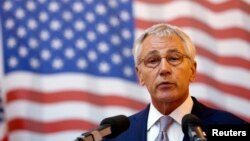CONSTANTA, ROMANIA —
The United States will strengthen its presence in the Black Sea region using part of a $1 billion fund promised to NATO allies on Russia's borders, and will continue to send warships to the area, Defense Secretary Chuck Hagel said in Romania on Thursday.
Hagel is the latest high-ranking American official to visit Europe since Russia's annexation of Crimea, as Washington looks to reassure allies jittery about Moscow's intentions in its former Cold War backyard.
The tour coincides with a visit by President Barack Obama to Poland this week, when he promised to increase military support for eastern European NATO members, including a $1 billion fund to support and train the armed forces of NATO states.
Formerly a secretive Communist state, Romania is now a member both of NATO and the European Union. Bucharest has been among the staunchest supporters of Western sanctions against Russia, has hosted joint military exercises with U.S. forces on its soil and participated in navy drills in the Black Sea.
Hagel was on a visit to the Romanian port Constanta, which recently hosted U.S. ships carrying out the navy exercises and where the Aegis guided missile cruiser USS Vella Gulf is currently berthed.
The $1 billion fund will allow for a “stronger presence of U.S. ships in the Black Sea,” Hagel said, adding that the presence of the Vella Gulf was an expression of Washington's commitment to regional security.
“We will sustain that tempo going forward,” Hagel told reporters, referring to the rotating presence of U.S. ships in the Black Sea since the Crimea crisis erupted.
Bucharest has openly called for an increased U.S. military presence in the Black Sea, and is particularly concerned about Russian intentions in its tiny neighbor Moldova, which used to be part of Romania and contains a Russian-speaking minority.
Since the standoff over Ukraine erupted, Romania has also pledged to raise its defense spending. That announcement drew praise from Washington, which has urged other NATO members to follow suit and review how their militaries are trained.
President Obama also used the visit to Poland to throw his weight behind the new president of Ukraine, amid an intensifying crackdown by Ukrainian forces against pro-Russian rebels.
The G7 group of industrialized nations has threatened to impose tougher sanctions on Russia if it does not help restore peace in eastern Ukraine.
Hagel is the latest high-ranking American official to visit Europe since Russia's annexation of Crimea, as Washington looks to reassure allies jittery about Moscow's intentions in its former Cold War backyard.
The tour coincides with a visit by President Barack Obama to Poland this week, when he promised to increase military support for eastern European NATO members, including a $1 billion fund to support and train the armed forces of NATO states.
Formerly a secretive Communist state, Romania is now a member both of NATO and the European Union. Bucharest has been among the staunchest supporters of Western sanctions against Russia, has hosted joint military exercises with U.S. forces on its soil and participated in navy drills in the Black Sea.
Hagel was on a visit to the Romanian port Constanta, which recently hosted U.S. ships carrying out the navy exercises and where the Aegis guided missile cruiser USS Vella Gulf is currently berthed.
The $1 billion fund will allow for a “stronger presence of U.S. ships in the Black Sea,” Hagel said, adding that the presence of the Vella Gulf was an expression of Washington's commitment to regional security.
“We will sustain that tempo going forward,” Hagel told reporters, referring to the rotating presence of U.S. ships in the Black Sea since the Crimea crisis erupted.
Bucharest has openly called for an increased U.S. military presence in the Black Sea, and is particularly concerned about Russian intentions in its tiny neighbor Moldova, which used to be part of Romania and contains a Russian-speaking minority.
Since the standoff over Ukraine erupted, Romania has also pledged to raise its defense spending. That announcement drew praise from Washington, which has urged other NATO members to follow suit and review how their militaries are trained.
President Obama also used the visit to Poland to throw his weight behind the new president of Ukraine, amid an intensifying crackdown by Ukrainian forces against pro-Russian rebels.
The G7 group of industrialized nations has threatened to impose tougher sanctions on Russia if it does not help restore peace in eastern Ukraine.





